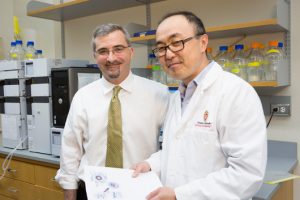Three-in-one nanomedicine packs powerful punch in early cancer studies

For patients suffering from metastatic lung or metastatic breast cancer, the prospects for successful treatment are limited and even the best outcomes may result in a diminished quality of life.
Driven by the knowledge that their unique combination of skills may save lives, pharmaceutical researcher Glen Kwon and radiation oncologist Dr. Kevin Kozak hope to make a difference. The two University of Wisconsin-Madison faculty members are developing a new drug combination and delivery method that promises to attack hard-to-treat solid tumors.
“Existing therapies are woefully inadequate for these kinds of tumors with four out of five lung cancer and three out of five metastatic breast cancer patients not responding to conventional treatments,” said Kozak, an assistant professor in the human oncology department with the School of Medicine and Public Health. “For patients and their families, these are devastating diagnoses. Yet when faced with these odds, the patients tend to be incredibly altruistic and often say they would like to be a part of something that could one day help others in the same situation. As a physician, I want to help expand the toolbox of options we have for them.”
With support from the Wisconsin Alumni Research Foundation’s Accelerator Program, Kwon and Kozak are working on a potent new combination of drugs and using nanoparticles called polymeric micelles to deliver the “drug cocktail.” Called Triolimus (tree-oh-LEE-miss), the three-in-one nanomedicine also serves as a possible focus of their startup company Co-D. Co-D’s efforts center on Kwon’s research into methods for improving drug delivery with new and existing drugs.
Kwon, a School of Pharmacy professor, hit on the concept for Triolimus after becoming convinced that three existing medicines weren’t achieving their full potential to help patients due to drug delivery concerns. The medicines – paclitaxel, rapamycin and 17-AAG – possess varying levels of effectiveness and work against different molecular targets to interfere with tumor cell growth and proliferation.
“These medicines need to be injected or infused by the intravenous route and the challenge was to achieve a stable, safe and sterile IV vehicle for combination cancer treatment,” Kwon said. “When you combine them and enable IV administration, they show a powerful synergistic effect with nonoverlapping side effects. That could mean a longer life and a better life for patients.”
But bringing paclitaxel, rapamycin and 17-AAG together as a three-in-one nanomedicine was unprecedented. Kwon said key challenges included a lack of water solubility of the medicines, poor stability and toxicity associated with existing IV vehicles such as surfactants and ethanol. Getting the desired ratio right also required significant effort.
After several years of experimentation, Kwon discovered a surprisingly simple way to formulate the three drugs as a three-in-one nanomedicine for IV injection or infusion: the three drugs and polymer (PEG-PLA) are dissolved in acetonitrile and evaporation of the organic solvent by reduced pressure leaves behind a thin amorphous film of the combined medicine and polymer. When mixed with water, the thin film dissolves, assembling into drug-loaded PEG-PLA micelles—tiny spherical beads that enable sterile filtration, IV injection or infusion of Triolimus as well as drug delivery to the intended destination.
Beyond its effectiveness in halting the growth of tumors and limiting their spread, part of the beauty of Triolimus lies in its scalability. The fact that it does not require the introduction of more complicated chemical or mechanical processes ultimately makes it more appealing to potential industry partners looking to manufacture it in large quantities, Kwon said.
In the meantime, however, Kwon and Kozak acknowledged they have their work cut out for them. They launched the startup company Co-D after recognizing growing reluctance in the pharmaceutical industry to take on many early-stage risks related to drug development.
“We are passionate about wanting to get this drug out to patients and without more data, we know we are unlikely to find a major company that is willing to commit to it,” Kwon said.
“Given that the cost of bringing a new cancer drug to market can top billions of dollars, most pharmaceutical companies want to see strong phase I and possibly phase II human clinical trial results,” Kozak said. “The industry investment environment and tolerance for risk has changed radically in recent years.”
As a result, the entrepreneurial scientists have hired a professional management team for their young business and are beginning the search for angel investors willing to support human clinical trials based on the strong performance of Triolimus in animal models.
“Through the university and WARF’s Accelerator Program, we’re fortunate to have access to some really good advice and a network of people who can offer help,” Kwon said. “Our hope is that all of this will ultimately work to the benefit of people who need next-generation medicines like Triolimus.”